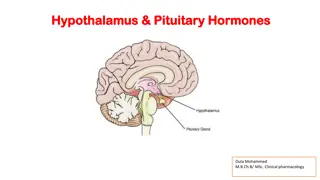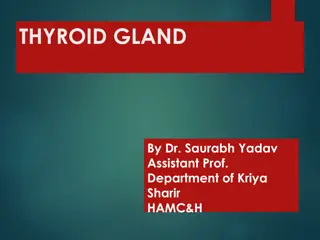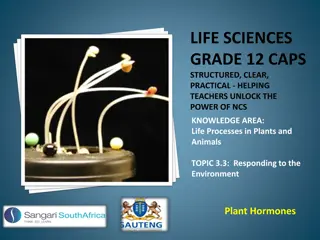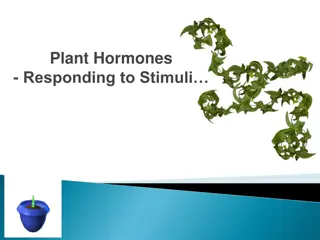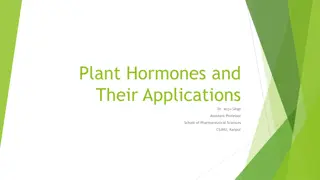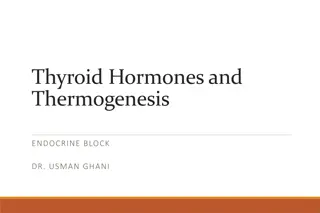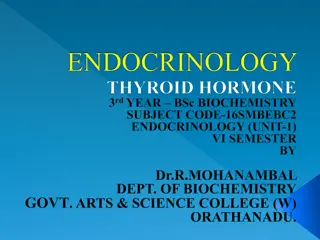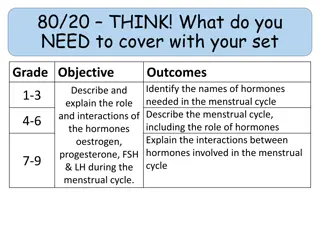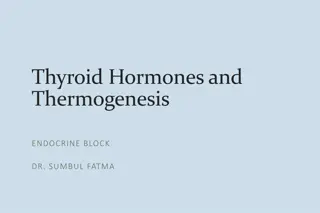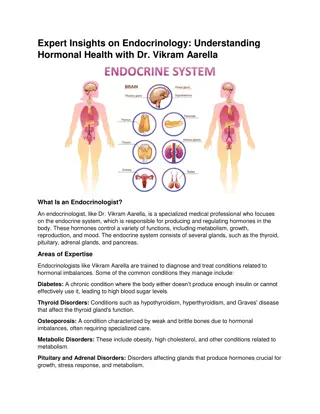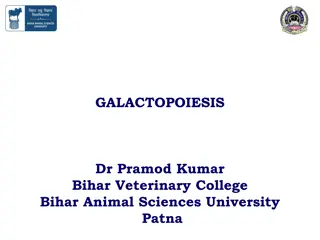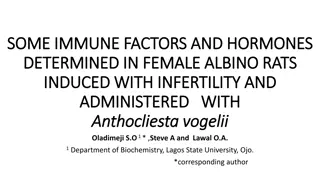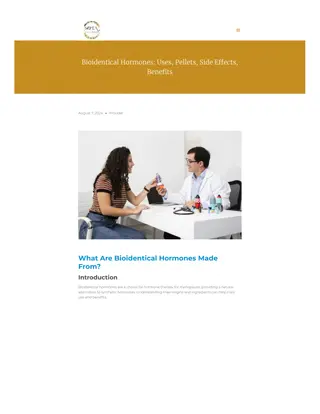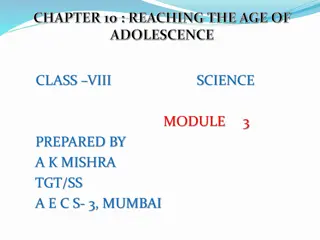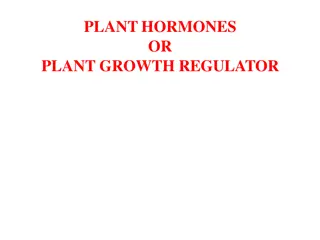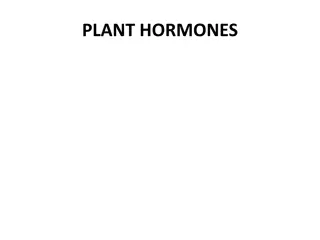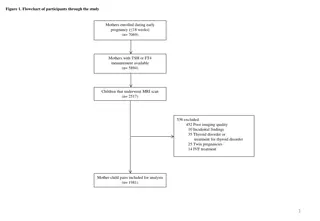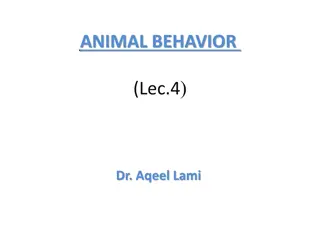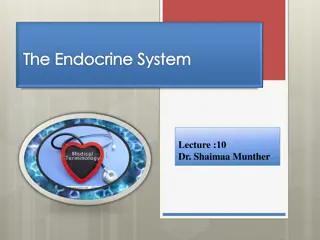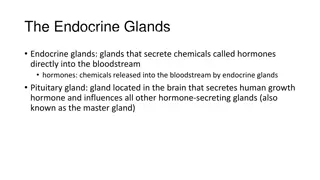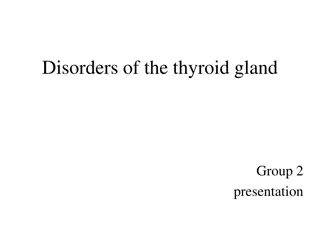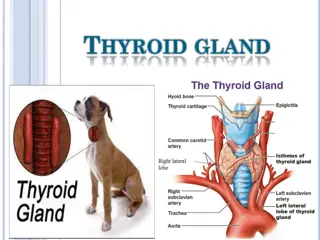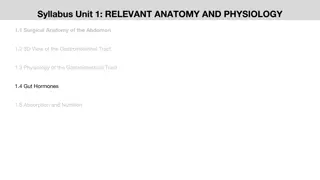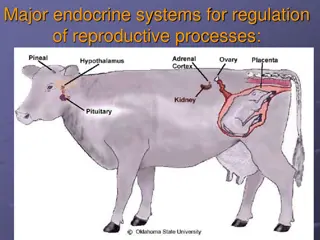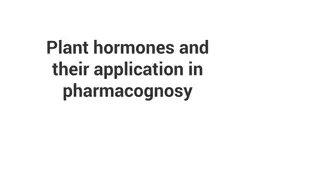Reproductive Hormones in Males and Females
Reproductive hormones play crucial roles in the body, acting as chemical signals released by endocrine cells. In males, hormones like testosterone, gonadotropin, and estrogen regulate various functions related to reproduction. Similarly, in females, hormones like GnRH, FSH, and LH are essential for
6 views • 16 slides
Hypothalamus and Pituitary Hormones in Clinical Pharmacology
Peptides and glycoproteins are secreted by the hypothalamus and pituitary, regulating anterior pituitary hormones. Hormones like adrenocorticotropic hormone (ACTH) and corticotropin-releasing hormone (CRH) play crucial roles. Synthetic adrenocorticosteroids have limited the use of corticotropin for
1 views • 28 slides
Bioidentical Hormone Replacement Therapy
Bioidentical Hormone Replacement Therapy (BHRT) involves using compounded hormones that are chemically identical to the hormones in the human body. Customized compounded bioidentical hormones offer flexible dosing based on individual needs, with growing clinical validation for hormone optimization.
1 views • 12 slides
Thyroid Gland: Functions and Hormone Synthesis
The thyroid gland is a vital endocrine gland located below the larynx, responsible for producing thyroid hormones essential for regulating metabolism. This gland consists of follicles lined with follicular cells, producing thyroglobulin and thyroid hormones T3 and T4. Iodine plays a crucial role in
1 views • 40 slides
Plant Hormones and Their Functions in Plants
Plant hormones play crucial roles in various plant processes such as growth, development, and response to environmental stimuli. Auxins, gibberellins, and abscisic acid are key plant hormones that regulate tropisms, cell division, elongation, flowering, seed germination, and dormancy. Understanding
1 views • 50 slides
Plant Hormones and Their Role in Growth and Development
Plant hormones are essential chemicals that enable plants to respond to environmental stimuli, regulate growth processes like cell division and elongation, and control key developmental stages such as flowering and fruit development. Key hormones include auxin, gibberellins, and abscisic acid, each
2 views • 34 slides
Hormonal Control in Animals: GCSE Biology Lesson
Explore the fascinating world of hormonal control in animals through this GCSE Biology lesson. Learn about hormones, the endocrine system, glands, and their roles in maintaining homeostasis. Understand the advantages and disadvantages of hormonal coordination, and study specific hormones and their f
0 views • 29 slides
Plant Hormones and Their Roles in Growth and Development
Plant hormones, also known as phytohormones, play crucial roles in regulating various cellular processes within plants. They affect gene expression, cellular division, and growth, among other functions. The five major classes of plant hormones include auxins, cytokinins, ethylene, gibberellins, and
0 views • 8 slides
Cell Communication and Signalling in Biology
Cells communicate through extracellular signalling molecules that bind to specific receptors on target cells, leading to changes in cellular behavior. Hormones such as steroid and peptide hormones, neurotransmitters like nor-adrenaline and acetylcholine, play crucial roles in cell signaling. Recepto
0 views • 25 slides
Thyroid Hormones: Biosynthesis, Functions, and Clinical Implications
This educational material delves into the types and biosynthesis of thyroid hormones, the physiological actions of thyroid hormones, regulation levels, thyroid function tests, goiter, and the distinction between hypo- and hyperthyroidism. It covers the role of thyroid hormones in thermogenesis, meta
1 views • 33 slides
Endocrinological Aspects of Pregnancy: Hormones, Functions, and Synthesis
During pregnancy, endocrinological structures like the corpus luteum and placenta play vital roles in the production of hormones such as progesterone and estrogens. Progesterone maintains pregnancy by controlling essential functions like endometrial differentiation, myometrial quiescence, and local
5 views • 15 slides
Thyroid Hormones and Their Role in Metabolism
Thyroid hormones, including triiodothyronine (T3) and thyroxine (T4), are essential for regulating metabolism, growth, development, body temperature, and heart rate. They are tyrosine-based hormones produced by the thyroid gland, requiring iodine for synthesis. T3 affects various physiological proce
2 views • 17 slides
The Hormones in the Menstrual Cycle
Explore the intricate role of hormones in the menstrual cycle, including the names and functions of key hormones like oestrogen, progesterone, FSH, and LH. Learn how these hormones interact and change throughout the cycle, influencing ovulation and menstruation. Dive into activities and resources to
6 views • 19 slides
Autacoids: Local Hormones and Their Role in the Body
Autacoids, also known as local hormones, are substances produced by various tissues that act locally to regulate the activity of smooth muscles, nerves, platelets, and other tissues. They play a crucial role in pain, inflammation, allergic reactions, and more. Serotonin, a key autacoid, has diverse
0 views • 20 slides
Thyroid Hormones and Thermogenesis in Endocrinology
This lecture covers the types, biosynthesis, actions, regulation, and clinical implications of thyroid hormones. It explains the functions of thyroxine (T4) and tri-iodothyronine (T3), their synthesis in the thyroid gland, and their transport in the body. The role of thyroid hormones in thermogenesi
2 views • 30 slides
Expert Insights on Endocrinology- Understanding Hormonal Health with Dr. Vikram Aarella
An endocrinologist, like Dr. Vikram Aarella, is a specialized medical professional who focuses on the endocrine system, which is responsible for producing and regulating hormones in the body. These hormones control a variety of functions, including m
2 views • 2 slides
Galactopoiesis and Milk Ejection in Veterinary Science
Galactopoiesis is the process of maintaining lactation in animals, involving hormones like prolactin, GH, cortisol, PTH, insulin, and oxytocin. This process also includes the role of progesterone, estrogen, and other hormones in milk production and release. Milk ejection, facilitated by oxytocin, in
0 views • 5 slides
Local Government Advisory Committee and Local Leadership Workgroup Collaboration
Collaboration between the Local Government Advisory Committee (LGAC) and the Local Leadership Workgroup (LLWG) focuses on engaging with local decision-makers, implementing strategies for local engagement, and supporting the flow of information among local governments in the Chesapeake Bay watershed
0 views • 10 slides
Immune Factors and Hormones in Female Albino Rats with Induced Infertility
The study examines immune factors and hormones in female albino rats induced with infertility and administered with Anthocleista vogelii extract. The investigation aims to assess the plant's purported traditional medicinal benefits for fertility enhancement in females. Methods include preparation of
1 views • 19 slides
Bioidentical Hormones - Benefits, Pellets and Side Effects
Benefits, risks, and uses of bioidentical hormones, including pellets, for menopause relief. ingredients and differences. Bioidentical hormones are a choice for hormone therapy for menopause, providing a natural alternative to synthetic hormones. Und
1 views • 5 slides
Power of Positivity: Daily Tips for Positive Thinking
Explore daily activities and strategies to enhance positive thinking, from managing overwhelming thoughts to practicing gratitude and understanding the influence of hormones on mood. Learn how breathing exercises, healthy carbohydrates, and laughter can contribute to a positive mindset. Engage in a
0 views • 21 slides
Hormones and their Role in the Body
Hormones are chemical messengers that play a crucial role in regulating various metabolic functions in the body. They are transported through the bloodstream to tissues and organs, affecting processes like growth, metabolism, and reproduction. Some hormones have autocrine and paracrine effects in ad
0 views • 25 slides
Hormones and Reproductive Changes in Adolescence
Changes during adolescence are driven by hormones like testosterone in boys and estrogen in girls, leading to physical developments such as facial hair growth and breast development. Hormones play a crucial role in initiating reproductive functions, with endocrine glands releasing hormones to target
0 views • 19 slides
Plant Hormones and Growth Regulators
Plant growth regulators, also known as plant hormones, play a crucial role in regulating growth and development in plants. They are organic compounds that act at low concentrations to promote, inhibit, or modify growth processes. The main plant hormones include auxins, cytokinins, gibberellins, absc
1 views • 40 slides
Enhancing Quality of Life for Individuals with No Adrenals: Insights from GoodHormoneHealth Webinar
Discover key insights on managing life without adrenals, including discussions on adrenal hormones, optimal replacement strategies, necessary tests, stress dosing, and more. Explore the roles of the adrenal glands, hormones such as cortisol and aldosterone, and the Renin-Angiotensin-Aldosterone Axis
0 views • 55 slides
Hormones in Implants and Their Relationship to Cancer Risk
Hormones found in implants and naturally in animals and plants can impact estrogen levels, but the connection to cancer risk is complex. This article explores the presence of hormones in food, the concept of nanograms, human estrogen production, and the implications of using implants in beef product
0 views • 33 slides
Plant Growth Hormones and Defense Mechanisms: Understanding Plant Responses to the Environment
Plant growth hormones and defense mechanisms play crucial roles in how plants respond to environmental stimuli such as water, sunlight, gravity, and more. From auxins promoting cell growth to gibberellins stimulating flowering, this presentation educates on the intricacies of plant hormones and thei
1 views • 13 slides
Plant Hormones and Their Role in Growth and Development
Plant hormones are vital compounds that regulate various processes in plant growth and development. They are mostly organic and can be gases. These hormones are produced in one part of the plant and transported to other parts where they induce physiological effects. The main phytohormones include Au
0 views • 125 slides
Maternal Thyroid Hormones and Offspring Brain Development: Study Flow and Findings
This study examined the association between maternal thyroid hormones (TSH and FT4) during early pregnancy and offspring brain morphology. A flowchart illustrates participant enrollment and exclusion, with subsequent MRI analyses on child brain volumes. Results show significant associations between
0 views • 4 slides
Insights into Animal Behavior and Hormones
Explore the fascinating world of animal behavior, from the deception of recognition mechanisms in gulls to Karl von Frisch's experiments on fish sensory abilities. Learn how behavioral assays shed light on animal sensory powers and how hormones play a crucial role in regulating animal behavior. Disc
0 views • 6 slides
The Endocrine System: Key Concepts and Functions
The endocrine system, consisting of glands that release hormones into the bloodstream, plays a crucial role in regulating various body processes like metabolism, growth, reproduction, and stress response. Key glands include the pituitary, thyroid, pancreas, adrenal, ovaries, and testes, each produci
0 views • 34 slides
How Hormones Interact: The Endocrine System
The endocrine system comprises glands that release hormones into the bloodstream, influencing various bodily functions. Key glands include the pituitary, pineal, thyroid, pancreas, gonads, and adrenal glands, each playing a crucial role in regulating metabolism, growth, stress response, and reproduc
0 views • 5 slides
The Endocrine System: Hormones, Glands, and Regulation
The endocrine system, comprising glands such as the pituitary, thyroid, pancreas, and more, produces hormones that regulate various bodily functions. These hormones target specific cells with receptors, influencing metabolism, growth, energy usage, and more. By understanding how hormones interact wi
0 views • 12 slides
Disorders of the Thyroid Gland: Group 2 Presentation
The thyroid gland, a vital part of the endocrine system, produces hormones that regulate metabolic processes, energy expenditure, and tissue growth. Dysfunction of the thyroid can lead to various disorders affecting overall health. Learn about the functions of thyroid hormones, diagnostic tests, and
0 views • 39 slides
Thyroid Gland: Structure, Hormones, and Function
The thyroid gland, a butterfly-shaped structure located on the ventral surface of the trachea, secretes hormones essential for regulating metabolic rate, growth, and development. It produces hormones like Tetraiodothyronine T4, Triiodothyronine T3, and Calcitonin, which play crucial roles in maintai
0 views • 21 slides
Role of Gut Hormones in Regulating Feeding Behavior
The syllabus covers relevant anatomy and physiology related to the gastrointestinal tract, emphasizing the regulation of feeding processes. It discusses the role of gut hormones such as ghrelin, obestatin, cholecystokinin, pancreatic polypeptide (PP), and peptide YY (PYY) in controlling appetite, en
0 views • 7 slides
Endocrine Systems in Reproductive Regulation
The endocrine system plays a crucial role in regulating reproductive processes by secreting hormones that influence cellular activity. This system involves ductless glands like the hypothalamus, pituitary gland, and other endocrine glands working together in a feedback mechanism. Hormones of various
0 views • 19 slides
Plant Hormones and Their Role in Pharmacognosy
Plant hormones, also known as phytohormones, are essential chemical compounds in plants that regulate various developmental processes. They include auxins, gibberellins, cytokinins, ethylene, and abscisic acid, each with specific functions in growth, reproduction, and response to environmental stimu
0 views • 21 slides
Overview of Endocrinology: Coordination of Body Functions by Chemical Messengers
The body's functions are coordinated by various chemical messenger systems, including neurotransmitters, endocrine hormones, neuroendocrine hormones, paracrines, autocrines, and cytokines. Endocrine hormones travel through the circulatory system, binding to receptors in cells to regulate metabolism,
0 views • 18 slides
Comprehensive Guide to Thyroid Disorders and Hormones
Delve into the anatomy, physiology, and disorders of the thyroid gland, including goiter, hyperthyroidism, and hypothyroidism. Explore the role of thyroid hormones in somatic and brain development, as well as fetal functions. Understand the synthesis, storage, and action of thyroid hormones, along w
0 views • 34 slides

